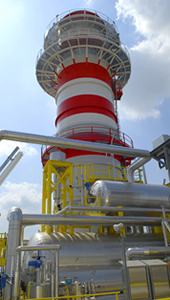Jobs secured at the Ferrara Power Plant (CEF), acquired by a group from the Czech Republic.
E.ON sells seven Italian power plants to the Eph group of the Czech Republic. The decision is not particularly surprising given the disinterest shown by the German company for the Italian electricity market, today a plan that has unfortunately been clear for some time and that underlines the fragility of electricity generation in Italy is being realized in detail.
The power plants that E.ON should sell to the Eph group guarantee an installed power of 4500 MW and are located in Fiume Santo in Sardinia, where there is a coal-fired plant, in Livorno Ferraris, Tavazzano, Ostiglia, Cef Ferrara, Trapani and Scandale where gas groups are active. The combination of these power plants supplies electricity to approximately one million families and businesses. Maintaining employment levels and the need to make prudent investments are the priorities of Cisl-Flaei.
One thing is certain – claims the general secretary of Flaei Cisl Carlo De Masi – the liquidation of the third “gen.cos” certifies in an inescapable way the failure of a badly thought out and even worse implemented liberalization of the electro-energy sector.
Today we are faced with a truly emergency situation, aggravated by questionable and ill-considered choices in terms of generation, with a highly unbalanced energy mix of sources, high costs, investments in new power plants forced to operate at a minimum rate, due to high management costs. All this is happening in the worst economic season ever recorded in world economic history.
The lack of a national energy plan has further aggravated – Carlo De Masi reiterates – the deficit of a liberalization that has clearly failed to achieve its objectives, the causes of which are now being faced on the front lines by workers and consumers. The aim was to innovate the electricity sector, modernize the system, find a balanced mix of sources, producing a reduction in electricity rates. The facts were very different.
As representatives of the working world, we have no objections to the transfer to another operator of the power plants that are the object of the sale between German and Czech companies, although the fragmentation of a group's activities at the time of their transfer may conceal pitfalls.
We hope that these choices will finally provide clarity and offer solid growth prospects to the plants acquired by a new owner.
We want to remember – says Carlo De Masi – how the union proposed to the government an integrated plan of interventions in favor of thermoelectric generation capable of managing the individual disputes in a general perspective, guaranteeing overall employment levels with the possible recourse to solidarity within the different production cycles, interventions necessary to modernize the system, guarantee better economic efficiency, reduce the environmental impact and build a medium and long-term development logic capable of guaranteeing the reorganization of the sector.
We hope that with the new Eph partners – concludes the general secretary of Flaei – we can build industrial relations aimed at promoting professionalism, in an increasingly open and participatory model that recognizes the primary qualities of work that are essential for offering quality and convenient services.



